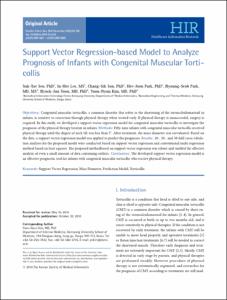KUMEL Repository
1. Journal Papers (연구논문)
1. School of Medicine (의과대학)
Dept. of Biomedical Engineering (의용공학과)
Support Vector Regression-based Model to Analyze Prognosis of Infants with Congenital Muscular Torticollis
- Keimyung Author(s)
- Park, Hee Jun; Park, Hyoung Seob; Yoon, Hyuck Jun; Kim, Yoon Nyun
- Journal Title
- Healthcare Informatics Research
- Issued Date
- 2010
- Volume
- 16
- Issue
- 4
- Abstract
- Objectives: Congenital muscular torticollis, a common disorder that refers to the shortening of the sternocleidomastoid in
infants, is sensitive to correction through physical therapy when treated early. If physical therapy is unsuccessful, surgery is
required. In this study, we developed a support vector regression model for congenital muscular torticollis to investigate the
prognosis of the physical therapy treatent in infants. Methods: Fifty-nine infants with congenital muscular torticollis received
physical therapy until the degree of neck tilt was less than 5o. After treatment, the mass diameter was reevaluated. Based on
the data, a support vector regression model was applied to predict the prognoses. Results: 10-, 20-, and 50-fold cross-tabulation
analyses for the proposed model were conducted based on support vector regression and conventional multi-regression
method based on least squares. The proposed methodbased on support vector regression was robust and enabled the effective
analysis of even a small amount of data containing outliers. Conclusions: The developed support vector regression model is
an effective prognostic tool for infants with congenital muscular torticollis who receive physical therapy.
Keywords: Support Vector Regression, Mass Diameter, Prediction Model, Torticollis
- Publisher
- School of Medicine
- Citation
- Suk-Tae Seo et al. (2010). Support Vector Regression-based Model to Analyze
Prognosis of Infants with Congenital Muscular Torticollis. Healthcare Informatics Research, 16(4), 224–230. doi: 10.4258/hir.2010.16.4.224
- Type
- Article
- ISSN
- 2093-3681
- 파일 목록
-
-
Download
 oak-aaa-01956.pdf
기타 데이터 / 449.3 kB / Adobe PDF
oak-aaa-01956.pdf
기타 데이터 / 449.3 kB / Adobe PDF
-
Items in Repository are protected by copyright, with all rights reserved, unless otherwise indicated.